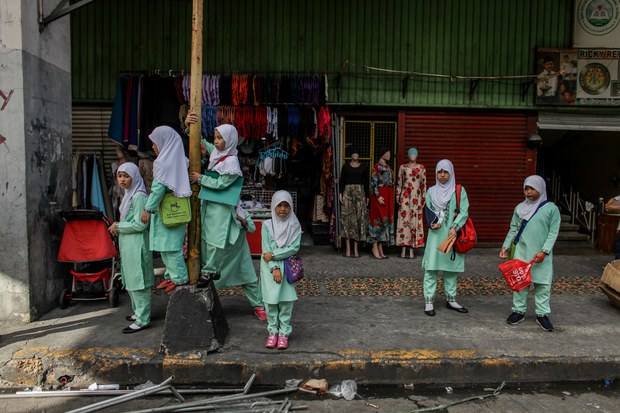Philippines: Muslim Scholars, Leaders Protest Military Plan to Monitor Schools
2020.10.19
Cotabato and Cagayan de Oro, Philippines
Updated at 2:47 p.m. ET on 2020-10-19
The Philippines’ largest Muslim religious organization and other community leaders on Monday slammed a revelation by the military chief who said last week that the armed forces would monitor Islamic schools due to intelligence reports that they are being used to recruit new militants.
Ebrahim Ismael, board member of the National Ulema Conference of the Philippines, an organization representing Islamic scholars, said the revelation would complicate the already tenuous relationship between Muslim civilians and the security sector.
“It’s wrong to say that madrassas are being used for terror groups’ recruitment. I am a product of madrassas and extremism was not taught to us,” he told BenarNews. “Maybe the militants operate their own Islamic school, but in general Islamic schools are not used for recruitment.”
Last week, Armed Forces chief Gen. Gilbert Gapay told journalists that the security sector would monitor Muslim schools to prevent the possible infiltration of militants linked to the extremist group known as Islamic State (IS). The Department of Education lists 500 madrassas nationwide, but many others are not registered, according to officials.
Internet-savvy IS propagandists have been enticing children through social media, Gapay said.
“We are now strengthening and enhancing our program as far as prevention when encountering violent extremism. We are coordinating now with the Department of Education, looking into different schools, particularly in Sulu and other parts of Mindanao,” Gapay said, referring to largely Muslim parts of the southern Philippines.
In response, Uztadz Hakimi Dimakuta, a Muslim religious leader in Lanao del Sur province in the south, stressed that radicalism was not being taught in Islamic schools. He said that “100 percent, (madrassas) are not propagating suicide bombings and other forms of terrorism.”
“I learned how to be a good citizen and how to deal with my fellow Christians,” he said, adding he had studied at a madrassa in his early years.
Meanwhile, Mujiv Hataman, a Muslim congressman, challenged Gapay to file charges if he could prove claims that the schools serve as conduits for militants to recruit students.
“I have never heard, not even once, any teaching about terrorism. In fact, we were taught not to do anything bad and not to hurt other people,” said Hataman, who is from the southern island of Basilan.
Basilan is where the Islamic militant group Abu Sayyaf established itself more than two decades ago.
“The Armed Forces should not be making general statements linking madrassas to terrorists without presenting irrefutable proof of its existence. It is dangerous and unfair, and it serves no real purpose but to unjustly put our schools in a very compromising situation,” Hataman said.
Gapay revealed the plan during an online forum with journalists on Oct. 13, just days after the arrest of Rezky Fantasya Rullie, an Indonesian Muslim woman who is believed to be barely out of her teens and who allegedly was plotting a suicide bomb attack on Jolo Island in Sulu province.
Authorities said her parents, Rullie Rian Zeke and Ulfah Handayani Saleh, carried out a twin suicide bombing at the Our Lady of Mount Carmel church on Jolo that killed 21 and themselves in January 2019. Military intelligence operatives said they believe Rullie has two siblings – a boy, age 10, and a woman, age 20 – who are being trained as suicide bombers.
Gapay’s revelation came months after the Manila police chief apologized after a plan to collect the names of students in the capital area went public.
In March, Manila Police District Chief Brig. Gen. Bernabe Balba apologized to Philippine Muslim leaders after his department was criticized for its plan to collect the names of high school and university students in the capital area.
The public learned about the plan through a memo leaked in January. It was canceled amid criticism that police in the capital of the predominantly Catholic country were singling out Muslim minority students.
Militants killed
Meanwhile, two Abu Sayyaf militants who were among eight inmates who escaped from the Basilan Provincial Jail last week were killed during a firefight Sunday in Isabela city, according to military officials.
Fugitives Nurhassan Lahaman, and Batuh Kusain Murag died during the shootout with Special Forces troops near Cabunbata village, regional military chief Lt. Gen. Corleto Vinluan Jr. said Monday.
Civilians had alerted the troops after spotting Lahaman and Murag roaming the area near the Special Forces camp.
“As the troops were advancing they were fired upon which resulted in brief firefight and the death of the suspects,” Vinluan said.
Troops recovered an M16 rifle and a caliber .45-caliber pistol along with ammunition – authorities said they did not know how the men acquired the weapons.
Vinluan said Lahaman and Murag along with two other Abu Sayyaf members were among eight detainees who escaped on Oct. 13 after killing a jail guard. Two of the escapees were captured hours after the jailbreak.
The pair were facing murder charges in relation to a July 2018 bombing that left 10 dead in Basilan’s Lamitan city.








